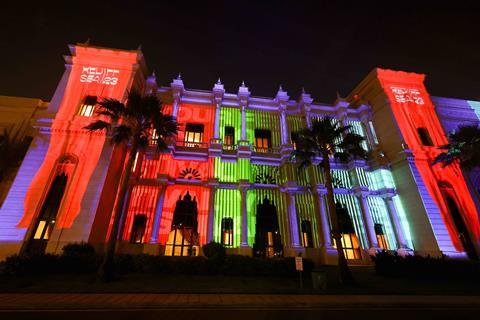
A significant number of international executives have beaten a path to the Red Sea International Film Festival’s market over the past week to explore opportunities in the rapidly growing Saudi film market.
The Souk took place for four busy days from December 2-5. All the major Saudi players were on the ground, firming up its reputation as the place to learn about the local industry and to strike up relationships.
Red Sea managing director Shivani Pandya Malhotra said industry accreditation was up by 10% on last year, and the number of exhibitors also grew at the Souk.
This growth came despite the Israel-Hamas conflict in the region and changes to schedules caused by ending of the actors’ strike.
Many of the execs with which Screen spoke were impressed. Film Clinic co-founder Mohamed Hefzy cited the quality of projects and the strong international presence. “This is the single most important source of financing for independent Arab cinema, which is why so many people are here looking for opportunities.”
Among those at the Souk were Eagle Pictures founder Tarak Ben Ammar, AGC Studios founder Stuart Ford and Mubi CEO Efe Cakarel. Ben Ammar enthusiasticallly compared Saudi’s nascent film industry to “California in the 1920s when cinema really blew up”.
Ford said the Saudi and Arabic language market had the potential to evolve like the South Korean industry and be “a really prolific exporter of premium entertainment content.”
As well as the opportunities, many of the execs were also looking to understand the challenges of working with the fledgling Saudi film industry – particularly around how to access its new 40% tax credit, navigate legal and business affairs in the country, and how to crew up productions.
Despite the government investment that is pouring into the sector, there is still sense it is a young industry learning to stand on its own two feet and that it will take time to develop the skills, processes and resources required to compete properly on the international stage.
There is confidence this will happen over time, thanks to support from organisations such as the Cultural Development Fund, the Saudi Film Commission, Ithra and the Red Sea Film Fund.
Red Sea Fund manger Emad Eskander told a panel it was a great time to be a Saudi filmmaker. “All the support that is coming from the government is unreal…at this stage, if you have a good pitch deck this year, you might be funded – everybody would go after you and try to make it happen. I’m not sure it is that easy for a lot of filmmakers around the world.”
The festival itself showcased eight films from Saudi Arabia, among them well received titles including Naga, Norah and Mandoob – an impressive achievement given the country only started making films a few years ago. “What’s been fabulous is the reception to the Saudi films that we’ve been presenting at the festival,” says Pandya Malhotra.
Many of the films had come up through the ecosystem created by the Red Sea Foundation, receiving support from its Red Sea Fund, mentorship through the Red Sea Labs platform and participation in the Red Sea Souk market before premiering at the festival.
The festival’s primary focus is on Saudi, Arab and African features, but it has also seen a slew of Hollywood stars pay a visit – among them Johnny Depp, Zoe Saldana, Will Smith and Chris Hemsworth. Arriving later this week are Halle Berry, Gwyneth Paltrow, Nicolas Cage and Andrew Garfield.
Their participation was undoubtedly a reflection of the status that Red Sea has quickly established for itself on the festival calendar and of the ambition it has for the future.
Maybe it was the late ending of the strike or festival organisational challenges, but the stars’ presence was sometimes not even confirmed until a day or two before their arrival. Some saw this as evidence that Red Sea is still a young festival learning the ropes.
Screenings were often different to those at other international film events. For the gala screening of opening night film HWJN at the Ritz Carlton hotel one third of the audience left the screening once the ceremony closed and before the film rolled. Among those who stayed, many held conversations as the film played; and more guests left throughout the screening to socialise at a party outside, leaving a relatively sparse audience for the end. There was no sense of the departures being in dissent at the film, rather of an audience engaging with cinema on its own terms. By contrast, for the the world premiere of Saudi filmmaker Tawfik Alzaidi’s Norah, held at the Vox Cinemas, every single member audience stayed till the end and greeted the director and cast enthusiastically after the credits rolled.
For 2024, the festival is set to move into a more central location in a specially-built new venue near the historic Al Balad neighbourhood of Jeddah. It could mark an important next step for an event that has established itself so quickly on the international stage.






![The Brightest SunScreen[Courtesy HKIFF]](https://d1nslcd7m2225b.cloudfront.net/Pictures/274x183/3/5/0/1448350_thebrightestsunscreencourtesyhkiff_312678.jpg)


















No comments yet